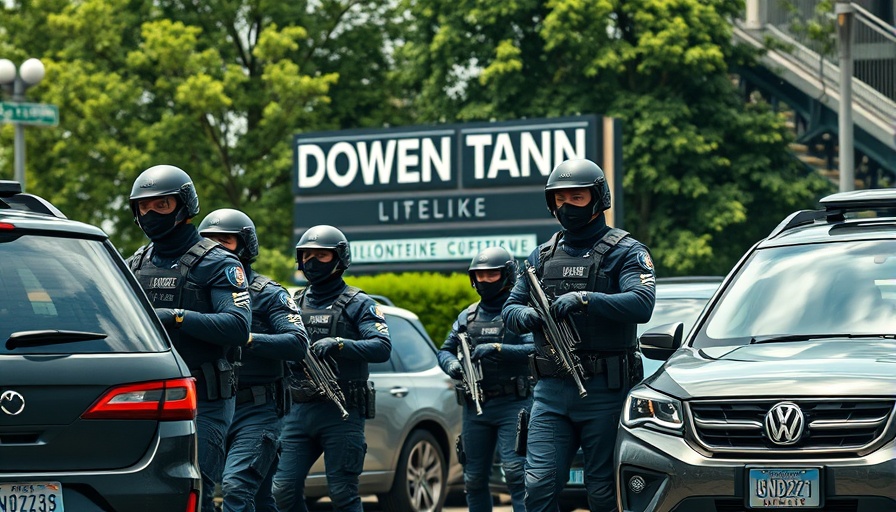
The Growing Tension Between Federal Immigration Actions and Local Law Enforcement
In recent months, a concerning trend has emerged in the realm of immigration enforcement across the United States. Reports have surfaced suggesting that armed immigration officers are frequently conducting raids without notifying local police departments. This disconcerting disconnect raises critical questions about the coordination between federal agents and local law enforcement, especially in communities like Bakersfield, where the immigrant population has been a vital part of the social fabric.
Understanding the Context of Immigration Raids
Immigration raids have long been a contentious issue, often sparking debates about legality, ethics, and the safety of immigrant families. The role of local police in these operations is particularly complex; while some argue that local jurisdictions should assist federal agents, others contend that community trust is jeopardized when immigration enforcement infiltrates local policing.
This complexity is compounded by a statement from LA's police chief, noting that the current situation is "unprecedented territory." This reflects a broader national concern where the invisibility of immigration actions can lead to heightened fear among immigrant communities, affecting their willingness to engage with law enforcement to report crimes or seek assistance.
The Impact on Community Relations
Many residents in Bakersfield depend on local police for protection from crime and emergencies. If local officers are unaware of federal immigration operations, it can lead to confusion and mistrust within the community. For immigrants, the fear of deportation can deter them from reporting crimes or cooperating with law enforcement, potentially leaving them vulnerable to crime.
This fear can significantly impact public safety as it creates a divide between immigrant communities and local police, complicating community safety initiatives. A more transparent partnership between federal and local agencies could facilitate greater trust and collaboration, allowing for a better-informed public.
Contrasts From Different Localities
Across the nation, the approach to immigration enforcement varies significantly. In some areas, local police departments actively collaborate with federal immigration agencies. In places where local policies discourage these efforts, such as sanctuary cities, a conscious choice is made to protect immigrants even if it means limiting federal cooperation.
Taking Bakersfield as a case study, a mixed approach can be observed. While local law enforcement seeks to uphold the law, the lack of communication about federal operations can undermine these efforts. This duality presents challenges not just for law enforcement, but also for community cohesion.
What This Means for the Future of Immigration Enforcement
The trend of immigration officers withholding information from local police forces could set a troubling precedent. If left unchecked, this disconnect may exacerbate tensions in neighborhoods within Bakersfield and similar communities across the United States. Future policies must prioritize communication and transparency to maintain community trust.
The ongoing discussions among lawmakers at the state and federal levels could pave the way for more cooperative frameworks between immigration enforcement and local policing. However, until these changes materialize, the uncertainty surrounding raids will continue to extensively affect community dynamics.
Moving Towards Solutions
For residents of Bakersfield, knowing how to navigate this complicated landscape is paramount. Advocates for immigrant rights encourage open conversations about safety and the importance of partnership with local law enforcement. Community meetings and forums can serve as avenues for dialogue, allowing residents to express their concerns and desires for protecting their homes and families.
Moreover, local lawmakers could play a pivotal role in advocating for measures that ensure better coordination between federal and local agencies, fostering mutual respect and understanding. Discourse focused on safety, rights, and community solidarity is essential as Bakersfield continues to evolve.
Conclusion: The Path Forward
As we reflect on the implications of immigration enforcement, it is vital for community members and law enforcement to engage in constructive dialogues. By acknowledging the fears and realities faced by immigrant families while ensuring the enforcement of laws, a more cooperative and safer environment can be established.
For those living in Bakersfield and surrounding areas, staying informed and involved in local decision-making processes can help shape a future that is secure, just, and inclusive. Be proactive, advocate for change, and promote an essential dialogue about community safety and immigration policies.
 Add Row
Add Row  Add
Add 



Write A Comment